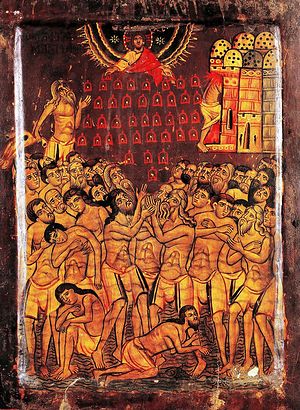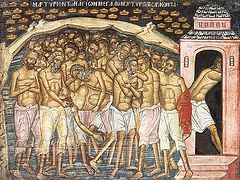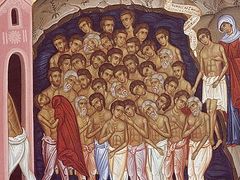The “Will and Testament” of the Forty Martyrs—the Roman soldiers of the Eleventh Thundering Legion (Legio XII Fulminata) who suffered in 320 in the town of Sebaste (Lesser Armenia)—is an important historical document and memorial of early Christian hagiographic literature. If the full text of the “Martyrdom” of the forty martyrs in its modern form is inarguably a later edition of an original that has not survived to our times, the “Will and Testament” is without a doubt an authentic text.
The “Will and Testament” was written on the night before the martyrs were cast into the Lake of Sebaste and consists of three parts. In the first part the martyrs express their desire to have their remains given to the priest Proidas and that they be buried in the village of Sarim without being separated, as was already accepted among Christians. In the second part they adjure Christians to remain steadfast in the faith, and in the third part, in conclusion they greet certain of their friends and relatives for the last time.
 Meletius Aetius1 and Eutichius—prisoners for Christ—to all bishops, presbyters, deacons, confessors, and all other (men of the Church) (abiding) in every city and country, rejoice in Christ!
Meletius Aetius1 and Eutichius—prisoners for Christ—to all bishops, presbyters, deacons, confessors, and all other (men of the Church) (abiding) in every city and country, rejoice in Christ!
1. When by the grace of God and of all of your common prayers we finish the struggle before us and attain the crowns of a higher calling, then we wish that our will would govern with regard to the transfer of remains by people to the presbyter, our father Proidas and our brothers Crispus and Gordius together with the laboring people, as well as to Cyril, Mark, and Sapricius—the son of Ammonius—with the aim of placing our remains in the village of Sarim,2 near the city of Zela.3 Although we come from different villages, we nevertheless prefer to be all in the same place of rest; for since we fought the same fight for the crown, so have we agreed to have the same repose in the above-mentioned village. Thus has it been willed by the Holy Spirit, and thus does it please us.
2. For this reason we also, together with Aetius and Eutichius and all our other brothers in Christ, ask our respected parents and brothers to be alien to all grief and disturbance, to respect this agreement of (our) brotherly society and zealously adhere to our desire, in order to attain through it the great gift of obedience and compassion from our common Father.
3. We also ask that no one should keep for themselves any remains extracted from the furnace,4 but take care to gather (them) into one, give them over to the above-mentioned (people), so that in showing their efforts of zeal, receive also (our) incorrupt profit of appreciation for the very pain of compassion (for us); like Maria [Magdalena], who without leaving the tomb of Christ and seeing the Lord before everyone else, first also received the grace of joy and blessing.
4. And if anyone should act against our wishes, let him be alien to divine profit, under sentence for any disobedience. Out of a worthless desire losing justice, (such) being compelled to cut us asunder from one another, (who are) as if one whole; us, who the Holy Savior joined to the faith by His grace and Providence.
5. If also the youth Eunoicus by the will of the Man-loving God achieves the same end of the struggle, let him also be worthy to abide also with us, and if by the grace of Christ he is preserved unharmed and yet tried in the world, we command to him that he freely abide in our martyrium5 and ask him to keep Christ’s commandments, that on the great day of the Resurrection he might seize the delight we hold in common, for while in the world he endured the same sorrows with us.
6. For gratitude to a brother beholds God’s Righteousness, but disobedience to those like oneself tramples upon the Lord’s commandment, because it is written: He that loveth unrighteousness hateth his own soul (Ps. 10:5).
II.
1. Thus, I ask of you, brother Crispus, and command you to be alien to all worldly voluptuousness and deceit, for the glory of (this) world is not strong but mutable: It blossoms for a short time but then slowly withers like the grass; it ends before it has even begun. But desire more to flee to the Man-loving God, Who gives those who have recourse to Him inexhaustible riches, and crowns those who believe in Him with eternal life.
2. The present time is appropriate for those who wish to be saved: On the one hand, it provides a large span of time for repentance, and on the other hand (it gives) implicit activity of life (for those) who do not put it off till the future. Changes in life are unforeseen; however if you have learned (this, then) behold the beneficial and also in this (life) show purity of reverence for God, so that being seized by it, (you might) erase the handwriting of your former sins, for (the Lord) said, “As I find you, so shall I judge you.”6
3. Thus, take care to be pure in Christ’s commandments, to that you might escape the unsleeping and eternal fire. For the divine voice calls out from ancient times that, the time is short (1 Cor. 7:29).
4. Thus, first of all honor love, for this honors the law of brotherly love, submitting to God according to the law, because through a visible brother the invisible God is also honored. These words (apply) to brothers from the same womb, but this opinion also (applies) to all the Christ-loving, for our Holy Savior and God said that brothers are not (only) those who are related to each other by means of a (common) nature, but who are united in faith in the best acts and who fulfill the will of our Father Who is in heaven.
III.
1. We greet lord presbyter Phillip, Proclianus and Diogenes together with the holy Church. We greet lord Proclianus, who (lives) in the village of Phidela together with the holy Church and his (people). We greet Maximus together and the Church, Magnus and the Church. We greet Domnus and his (people), our father Elias and Valius together with the Church. I also greet Meletius, my relatives Lutanius, Crispus, and Gordius and his (people), Elepidius and his (people), Iperichius and his (people).
2. We greet those living in the village of Sarim, the presbyter and his (people), the deacons and their (people), Maximus and his (people), Hesychia and his (people), Cyriacus and his (people). We greet all those who live in Chaduphi by name. We greet all those in Charisfoni by name. I, Aetius, also greet my relatives Mark and Acquiline, presbyter Claudius and his brothers Mark, Triphon, Gordius and Crispus, as well as my sisters and my spouse Domna and my child.
3. I also greet Eutichius in Ximare,7 my mother Julia and my brothers Cyril, Rufus, Riglus and my sister Cyrilla and my lady Vasilia, as well as the deacons Claudius, Rufus, and Proclus. We greet also the servants of God’s Church Sapricius (son) Ammonius, Genesius and Susanah and her (people).
4. Thus, we greet all of you in our Lord, we all—forty brothers and fellow prisoners: Meletius,8 Aetius, Eutiches, Cyrion, Candidus, Agnius, Gaius, Chudion, Heraclius, John, Theophilus, Sisinius, Smaragdus, Philoctimon, Gorgonius, Cyril, Severianus, Theodulus, Nicholas, Flavius, Xantheas, Valaerius, Hesychius, Dometian, Domnus, Helianus, Leontius, who is Theoctistus, Eunoicus, Valens, Acacius, Alexander, Vikratius, who is Vivianus, Priscus, Sacerdon, Ecditius, Athanasius, Lysimachus, Claudius, Elias, and Meliton. Thus, we—forty prisoners of our Lord Jesus Christ—by the hand of Meletius, one of us, have signed and confirmed all the above-written, and it was pleasing to us all. We pray with our souls and the Divine Spirit, so that we would receive the eternal blessings of God and His Kingdom, now and for all ages. Amen.9
Translated from the Russian version by OrthoChristian.com
(Translated into Russian from ancient Greek by Gevorg Kazaryan)
1 The Armenian saint’s name Aetius (from the Greek “Aetos”, or “eagle”) is translated as “Avetis” (which means in Armenian “good tidings”).
2 Sarim is an unknown toponym, as also are the toponyms named in the “Will”, Phidela, Chadufi, and Charisfoni.
3 Zela is a city in the Hellesponte. In 47 B.C., in the battle at Zele Julius Ceasar conquered the Pontan king Pharnak, after which he left his famous saying, “I came, I saw, I conquered”.
4 The bodies of the forty martyrs were committed to the fire after they miraculously survived the lake. From this part of the “Will” it becomes clear that orders for their burning had been given earlier.
5 A Martyrium (from the Greek “martis”—“witness” (in English “martyr”) was an early Christian church built on the tomb of martyrs.
6 One of the sayings of Jesus Christ not written in the Gospels. It came to us in the “Dialogue with the Jew Triphon” of Holy Martyr Justin the Philosopher (2nd c.).
7 Ximara, or Zimara—villages in Lessor Armenia that survived until the Armenian Genocide in 1915.
8 As a comparison of the names shown in the “Will” with the names in the Menaion, it was Meletius who did not withstand the cold and ran out of the lake into the bathhouse, where he quickly gave up the ghost. His place was then occupied by Aglais.
9 It’s worth noting that the last will and testament of the Forty Martyrs was not fulfilled by the Christians, because after their burned relics were retrieved from the lake they were quickly divided amongst the faithful.



